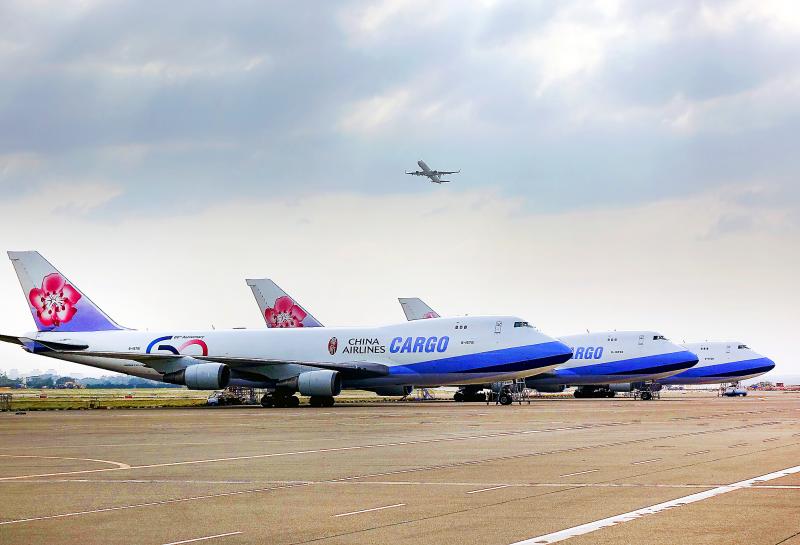The stricter anti-COVID-19 measures that the Central Epidemic Command Center (CECC) has imposed on China Airlines Ltd (CAL, 中華航空) are predicted to reduce the airline’s cargo capacity by about 10 percent, the company said yesterday, rejecting market speculation of a 50 to 80 percent cut.
A CAL official told the Taipei Times that the center’s measures, dubbed the “Down to Zero 2.0” plan, had been misunderstood, as many thought that all 1,279 CAL pilots would immediately stop flying and be quarantined at government centers.
“That is not the case,” the official said by telephone.

Photo: Chu Pei-hsiung, Taipei Times
The center would divide the pilots into two groups — low risk and high risk — and have all of them quarantined step by step so that the airline’s operations would not be significantly affected, the official said.
CAL pilots who are in a quarantine hotel or at a collective quarantine station would be in the low-risk group, and could fly after 14 days of isolation and testing negative for COVID-19, the official said.
The rest of the pilots, who would form the high-risk group, could continue to fly, but they would need to quarantine for 14 days. If they tested negative, they could be switched to the low-risk group.
However, pilots in the two groups would not fly together, the company said.
Once all of the pilots were in the low-risk group, the new measures could be dropped, but that is expected to take three months.
Over those three months, CAL would prioritize cargo operations over its passenger business, as Taiwan is a trade-oriented economy and many local companies rely on exports, the company said.
However, passenger operations would not halt, it added.
Even though the company only expects a 10 percent cut in its cargo capacity, the new measures would still affect the air cargo market, a freight forwarder manager said by telephone.
“It is uncertain by how much CAL’s air cargo rate can increase, as this week’s flights and freight rates have been set in the contracts. We are waiting for CAL to decide which flights will be canceled,” the manager said.
“We are worried more about the capacity issue than the rates, as there are no airlines that can offer additional flights to offset the reduction in CAL’s capacity. So it is certain that some clients will be affected,” he said.
Some products, such as panels, chips and other technology products, are not suitable for ocean transport, so it is a challenge to transfer the air cargo orders to surface shipping, he said.
Taiwan Semiconductor Manufacturing Company (台積電) and United Microelectronics Corp (聯電) said that their shipments are not likely to be significantly affected by CAL’s reduced cargo capacity.
Chip packaging and testing firm ASE Technology Holding Co (日月光投控) and passive components maker Yageo Corp (國巨) expressed similar views.
Additional reporting by CNA

SEMICONDUCTORS: The firm has already completed one fab, which is to begin mass producing 2-nanomater chips next year, while two others are under construction Taiwan Semiconductor Manufacturing Co (TSMC, 台積電), the world’s largest contract chipmaker, plans to begin construction of its fourth and fifth wafer fabs in Kaohsiung next year, targeting the development of high-end processes. The two facilities — P4 and P5 — are part of TSMC’s production expansion program, which aims to build five fabs in Kaohsiung. TSMC facility division vice president Arthur Chuang (莊子壽) on Thursday said that the five facilities are expected to create 8,000 jobs. To respond to the fast-changing global semiconductor industry and escalating international competition, TSMC said it has to keep growing by expanding its production footprints. The P4 and P5

DOWNFALL: The Singapore-based oil magnate Lim Oon Kuin was accused of hiding US$800 million in losses and leaving 20 banks with substantial liabilities Former tycoon Lim Oon Kuin (林恩強) has been declared bankrupt in Singapore, following the collapse of his oil trading empire. The name of the founder of Hin Leong Trading Pte Ltd (興隆貿易) and his children Lim Huey Ching (林慧清) and Lim Chee Meng (林志朋) were listed as having been issued a bankruptcy order on Dec. 19, the government gazette showed. The younger Lims were directors at the company. Leow Quek Shiong and Seah Roh Lin of BDO Advisory Pte Ltd are the trustees, according to the gazette. At its peak, Hin Leong traded a range of oil products, made lubricants and operated loading

Citigroup Inc and Bank of America Corp said they are leaving a global climate-banking group, becoming the latest Wall Street lenders to exit the coalition in the past month. In a statement, Citigroup said while it remains committed to achieving net zero emissions, it is exiting the Net-Zero Banking Alliance (NZBA). Bank of America said separately on Tuesday that it is also leaving NZBA, adding that it would continue to work with clients on reducing greenhouse gas emissions. The banks’ departure from NZBA follows Goldman Sachs Group Inc and Wells Fargo & Co. The largest US financial institutions are under increasing pressure

TRENDS: The bitcoin rally sparked by US president-elect Donald Trump’s victory has slowed down, partly due to outflows from exchange-traded funds for the token Gold is heading for one of its biggest annual gains this century, with a 27 percent advance that has been fueled by US monetary easing, sustained geopolitical risks and a wave of purchases by central banks. While bullion has ticked lower since US president-elect Donald Trump’s sweeping victory in last month’s election, its gains this year still outstrip most other commodities. Base metals have had a mixed year, while iron ore has tumbled, and lithium’s woes have deepened. The varied performances highlight the absence of a single, over-riding driver that has steered the complex’s fortunes, while also putting the spotlight